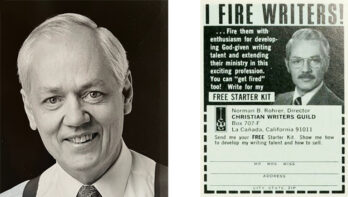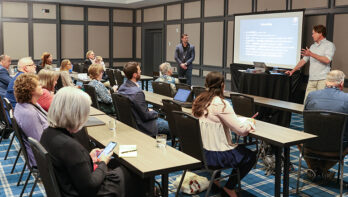
By Stephen R. Clark
Writers of all ilks are exhorted to write for a market. To research and ferret out what readers want to read and give it to them. We are told this is the key to successful sales. Publishers hear the same siren’s call to always keep the audience in mind.
For Christian writers and publishers, this is a little more complicated. Or should be. Tension rightly arises when weighing market want against need.
In a 60 Minutes interview, music producer Rick Rubin declared, “The audience comes last. The audience doesn’t know what they want. The audience only knows what’s come before” (italics mine).
The interview aired in May 2023. Rubin’s brash declaration hit me right in the frontal lobe, threading through my introvert’s longer neural pathway deep into my heart.
This, I believe, points past wisdom toward the challenge of discernment.
For Christians, we know all about wisdom. We simply look to the life of Solomon and James 1:5 and we’re all set. Wisdom is the accretion of knowledge, information, experience, common sense, and education.
Wisdom fuels content, the stuff we write and publish. But discernment is different.
Wisdom merely provides the pieces and parts of content, while discernment guides us in choosing the right pieces and parts and applying them to the true need.
Need is not about what you or I want. Need is about something that’s not there, something missing that’s needed.
When we go to the audience—the market—and ask what do you want? The response will be, “Candy! All the candy in the world!” Discernment says, “Candy is nice but what you need are vegetables. Have some carrots, cauliflower, and kale.”
For example, a common caution for churches is to resist modeling the success of another church and applying it cookie-cutter style to theirs. Church leaders cry out, “But we need to grow now! Let’s do that thing the Giant Mega Church over there did!”
What happens is often chaos, frustration, and disappointment. Or, at best, it generates some temporary feel-good emotion while addressing no one’s real needs. There is no lasting positive impact. Still, we give it the old college try and feed the market what it wanted.
Discernment might, instead, point the way to deep change needed in the hearts of the congregation. This is something far more challenging than merely providing another program!
It makes sense to us to believe pastors must lean into discernment to lead their congregations. But writers and publishers? Really?
Market research, surveying readers, and analyzing data, no matter how complex is still far easier than relying on discernment to lead the way. It’s an unpaved path forward that must be intentionally chosen and trustingly forged.
Rubin’s quote is insightful. It perhaps can be better stated as, “The audience doesn’t know what they need. The audience only knows what’s come before.” As we’ve seen, the audience actually knows what it wants. It wants more of the same because that’s what they know. They want what’s familiar and comfortable. We all do! But that’s probably not what we need.
We tell God, “More milk and honey please!” And God says, “Nope. You’ve been milk-drunk too long. It’s time for meat. Rare. With a side of kale.” If we’ve not tasted and seen that the meat is good, we are reluctant to leave the milk. We know milk. We know honey. We know the delicacies of Egypt, why go deeper in the wilderness? Why fix what’s not seen as broken? Why change what seems to be working?
Yes, I know, diverging from the norm and doing something different—taking that path less trod—is radical and risky. For writers, it might lead to a lot of rejection. For publishers, sales could falter, especially if platform is ignored.
But maybe not. To borrow from Donald Rumsfeld, we don’t know what we don’t know. That’s especially true for the audience, the market that only knows what has come before.
To discern takes time, focus, and prayer. A lot of prayer and not something perfunctory to kick-off a strategy meeting. Discernment is not a quick fix. Above all, it requires being in deep relationship with God, the Source of our call, the Source of our talent, the Source of our entire reason for being.
Gaining discernment requires surrendering control to allow revelation and spiritual insight to break through, pointing us in the right direction to pursue. Then, leaning on God, he will provide the courage to proceed, as we make the crooked straight and rough places plain. At least that’s the hope.
The challenge for us who write and publish for the kingdom is, how will we decide what we write and publish? Will we produce more of the same, what’s come before, feeding want? In other words, do we scratch itching ears or aim to reveal the face-planting, life-transforming glory of the Lord?
Discernment requires a deep commitment to God and an openness to the Holy Spirit. It means being willing to set aside agendas and market forces. It requires vulnerability and malleability. Acting on what is discerned takes courage and tenacity. Especially when the direction discernment aims you is not the same as where everyone else seems to be going.
Stephen R. Clark is a writer living in Lansdale, PA with his wife, BethAnn, where they are members of Immanuel Church. He is an associate member of the EPA and managing editor of the Christian Freelance Writers Network blog (tinyurl.com/cfwriters). His writing has appeared in Bible Advocate, Outreach, The Baptist Paper, Influence, and other periodicals. Learn more at StephenRayClark.com.
Posted Sept. 3, 2024





